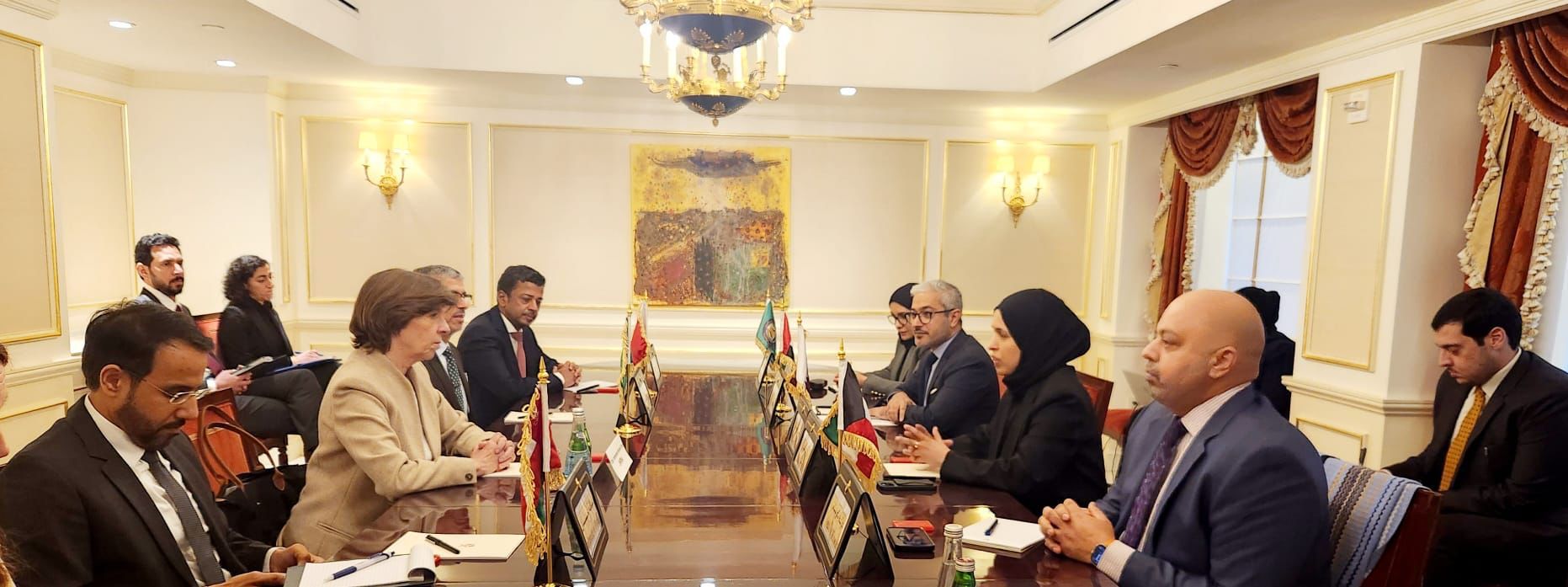Sheikha Alya conveyed the unwavering support of GCC nations towards the Independent Review Group’s endeavours in executing its mandate to the fullest.
Qatar’s permanent representative to the United Nations [UN], Sheikha Alya Ahmed bin Saif Al-Thani, convened a meeting at the headquarters in New York between UN representatives of GCC countries and Catherine Colonna, Chair of the Independent Review Group on the United Nations Relief and Works Agency for Palestine Refugees in the Near East (UNRWA).
The meeting was held in light of Colonna’s presentation of the initial report to UN Secretary-General Antonio Guterres on the investigations of the group’s autonomous review of UNRWA’s operations.
During the meeting, Colonna elaborated on the early findings of the Independent Review Group.
Sheikha Alya conveyed the unwavering support of GCC nations towards the Independent Review Group’s endeavours in executing its mandate to the fullest and reiterated the GCC’s steadfast backing for UNRWA, acknowledging its commendable humanitarian efforts spanning over seven decades.
These efforts, she highlighted, are directed at alleviating the suffering of Palestinians grappling with dire humanitarian circumstances amid the Israeli genocide in Gaza.
Early March, Qatar called for the need for “urgent international action” to end the war in Gaza and address its “catastrophic humanitarian conditions,” while pledging an additional $25 million to support the UNRWA.
This follows significant funding cuts by its biggest donors, including the United States.
At least 16 countries had decided to halt funding UNRWA after Israel accused 12 of UNRWA’s employees of allegedly being involved in Hamas’s surprise attack of October 7, 2023.
The countries represented $440 million of the agency’s overall funding, according to UNRWA.
The funds to the agency, which is a crucial lifeline for two million people in Gaza, were cut based on unverified Israeli reports of 12 employees who “may have been involved” in the “Hamas attack on October 7.”
There are 30,000 UNRWA members and Israeli interrogation is accusing only 0.04% of them.
In January, UNRWA reported the dismissal of several employees and initiated an investigation into Israel’s allegations against some of its staff.
Following this development, the United States suspended funding to a 30,000-member UNRWA, citing allegations against 12 employees.
Since the brutal war began nearly six months ago in Gaza, Israel has so far killed 165 UNRWA workers in Gaza, the highest death toll among UN staffers ever, however, the U.S. failed to call for an immediate interrogation into the case or mere issuance of condemnation.
More than 150 UNRWA facilities were hit, some destroyed, with many of them being schools.
Speaking at the UNGA in early March, Sheikha Alya Qatar condemned “the systematic targeting campaign aimed at dismantling UNRWA,” urging those who suspended their donations to the agency “to review their decisions.”
“[Qatar] expresses its regret over the suspension of some donor countries’ funding allocated to the agency, to which there is no alternative, and on which five million Palestinians depend, especially in light of the current catastrophic humanitarian conditions in Gaza,” Sheikha Alya said, as cited by the foreign ministry.
The U.S. is reportedly lobbying countries to fund UNRWA despite freezing its funding to the agency, sources told Middle East Eye in early March.
The Japanese government is preparing to resume its funding to UNRWA as early as April, reports said.
U.S. Deputy Secretary of State Victoria Nuland reportedly asked Turkish officials in late January that Ankara and Gulf countries “should fill the gap,” Turkish sources told the news outlet.
UNRWA was established in 1949 in light of the forced dispossession of Palestinians by Israel to make way for illegal Jewish settlers.
The agency has since supported refugees across the West Bank, Gaza, Syria, Lebanon, and Jordan.
The funding cut came at a critical time as Gaza’s dire humanitarian situation worsened under the ongoing Israeli war coupled with the complete air, land and sea blockade.
The Israeli war has killed at least 32,333 Palestinians while displacing more than 80% of the population.







